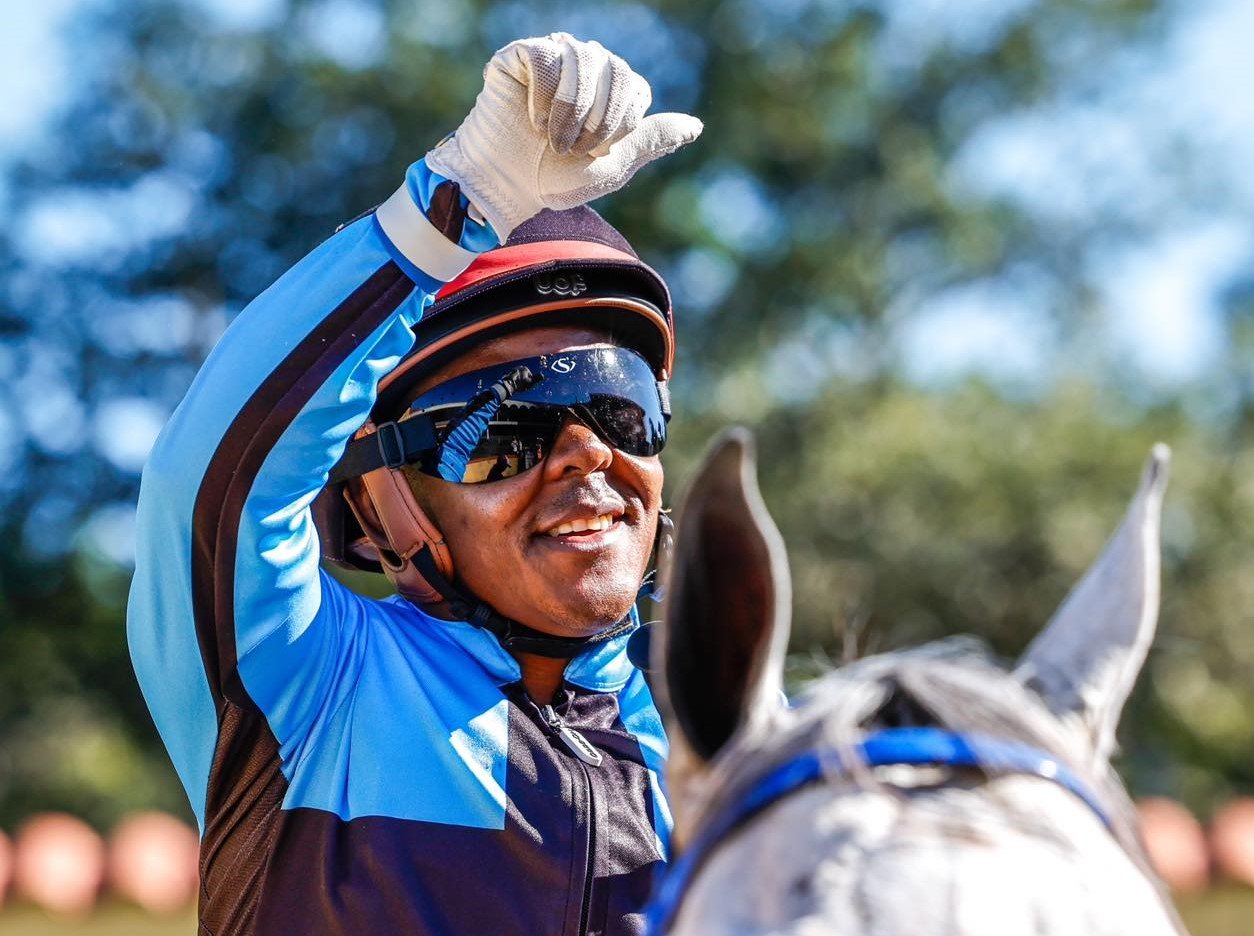
Biting off more than he can chew? That’s Kevin Ackerman on the right
Kevin Ackerman, the chief executive of Towcester racecourse, was one of four men disqualified from racing for between six months and eight years by the British Horseracing Authority’s disciplinary panel on Monday, at the end of a lengthy investigation into the running and riding of Ad Vitam in a series of races in 2011 and 2012.
David M Greenwood, a professional gambler who claims to have made £5m from betting in the last 10 years and the former owner of Ad Vitam, was disqualified for eight years.
Greenwood was found to have conspired with Michael Stainton, who rode Ad Vitam in several of the races at the centre of the investigation, to ensure that the horse was beaten in order to reduce its handicap mark. Stainton was disqualified for two years while Ackerman and Kenneth Mackay, also a professional gambler, were disqualified for six months and fined £5,000 for laying Ad Vitam to lose on Betfair, knowing that Stainton would, if necessary, prevent the horse from winning.

Two year ban for Michael Stainton
All four were found in breach of the Rules of Racing at a disciplinary hearing last month. Claire Murray, a former apprentice jockey who rode Ad Vitam in two of the races involved in the investigation, was cleared of any breach at the same hearing. The penalties for those found guilty were decided at a separate hearing on Monday morning, following the publication of the disciplinary panel’s full reasons for their finding. The panel’s reasons reveal two distinct stories of corrupt practice surrounding Ad Vitam but only one conspiracy, between Greenwood and Stainton.
The conspiracy was a deliberate attempt, over the course of several races, to lower the handicap mark of Ad Vitam by ensuring he ran down the field, and prime him for a gamble at a later date. Greenwood is described as “a high stakes gambler who had considerable success”, turning over “about £1m” each week.
Greenwood, a former pundit with William Hill Radio, is portrayed by the disciplinary panel as “sharp” and “a stranger to false modesty [who] described himself to the panel as one of the best five race readers in the country”.
In two races Greenwood booked Murray to partner Ad Vitam, one of three female apprentices to ride the horse and chosen “because he [Greenwood] liked to give rides to girls, especially if pretty”. She was an inexperienced jockey and the panel notes that “she rode weakly, but that was all she was capable of, and hence she was not in breach of the Rules [by trying to stop Ad Vitam]”.
The panel adds that Murray “later came to recognise that she did not have the ability to ride professionally and so she relinquished her licence”, while also deciding that Greenwood “was much too sharp to try to make a corrupt bargain with a jockey he did not know well”.
![dick-francis-come-to-grief-pb-9780330347778-26220-p[ekm]191x300[ekm]](https://www.sportingpost.co.za/wp-content/uploads/2015/10/dick-francis-come-to-grief-pb-9780330347778-26220-pekm191x300ekm-191x300.jpg) Stainton, however, was a personal friend of Greenwood and reportedly described as his “best friend” by the owner to a mutual acquaintance. He was found to have deliberately ridden a “stopping” race on Ad Vitam at Kempton on 2 November 2011, when the horse was very slowly away and raced wide throughout before finishing sixth of 12 runners.
Stainton, however, was a personal friend of Greenwood and reportedly described as his “best friend” by the owner to a mutual acquaintance. He was found to have deliberately ridden a “stopping” race on Ad Vitam at Kempton on 2 November 2011, when the horse was very slowly away and raced wide throughout before finishing sixth of 12 runners.
“The recordings,” the panel says, “show that he did not make any effort to dip down to drive his horse forward just before the gates opened, as all the other jockeys did.” The panel “could find no honest explanation for racing so wide and Stainton could not supply one”.
It decided that it was a deliberate failure to ride Ad Vitam on its merits, since “there were simply too many startlingly poor features of the ride to permit a less serious conclusion”.
Greenwood’s target was a race at Wolverhampton on 8 March, in which Ad Vitam, who had a handicap rating of 60 when claimed by the owner, raced off a mark of 46. Greenwood placed bets of £16,266 for Ad Vitam to place and £7,887 to win, making an overall profit of £8,378 when Ad Vitam finished second, while Stainton, the panel said, “rode with a vigour that was quite absent” in earlier races.
While Greenwood was priming Ad Vitam for a gamble, meanwhile, Ackerman, also a close friend, and Mackay, who knew Greenwood from on-course betting activity, were aware that the horse was not “wanted” in earlier races.
Both placed lay bets on Betfair as a result and, while Greenwood was found to have been unaware of their activity, the panel decided that their abuse of inside information still amounted to a corrupt practice. Their six-month suspensions are the minimum that the panel could have been expected to impose. Pending an appeal, Ackerman is now banned from entering a racecourse in any of the world’s major racing nations, including Towcester. His six-month ban covers six fixtures, the first of which is scheduled for 5 November.
It was the only comment offered by any of the individuals concerned as they left, but Greenwood and Ackerman subsequently issued a statement through Stewart-Moore Solicitors which said that both will lodge appeals against the panel’s findings.
Stainton, who was represented at the hearing by Paul Struthers, the chief executive of the Professional Jockeys’ Association, and Mackay are also believed to be considering appeals.

Towcester Racecourse
“Mr Ackerman and Mr Greenwood have been found in breach of the rules of racing on the basis of charges that were never put to them,” the statement from Stewart-Moore said. “Obviously that is fundamentally unjust.
“In any event the panel’s findings are completely illogical. The finding that there was no conspiracy between Mr Greenwood and Mr Ackerman means just that – there was no conspiracy and therefore the BHA’s case fails. The fact that the panel has contrived to find our clients in breach in these circumstances makes absolutely no sense whatsoever.
 “Both Mr Ackerman and Mr Greenwood will be appealing the panel’s finding given the very obvious and fatal flaw in the panel’s reasoning.”
“Both Mr Ackerman and Mr Greenwood will be appealing the panel’s finding given the very obvious and fatal flaw in the panel’s reasoning.”
In a statement released through the PJA , Struthers expressed the association’s deep disappointment at the panel’s verdict.
“In my opinion,” Struthers said, “the reasons paint a far from complete picture of the evidence heard. When that is combined with the fact that the BHA’s case against the jockeys – that of a lay betting conspiracy – completely failed, it is a gross understatement to say that we are bitterly disappointed with the outcome.
“We don’t accept the panel’s conclusions and having taken advice we believe we have strong grounds to appeal and will do so within the next 48 hours. It would be inappropriate for me to comment further pending that appeal, except to say that there are many deeply troubling aspects to this investigation and hearing that the BHA will need to address in due course.”
www.theguardian.com








